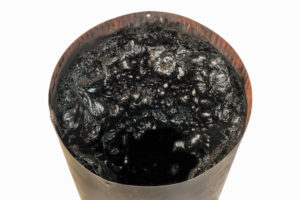While chimneys are often left unused and forgotten during the warm summer months, there is one way a chimney can make its presence known on a hot summer day: By filling your home with an unpleasant odor.
Common causes of stinky chimneys
Once that smell starts to waft in from your chimney your first question likely is: What is that smell? Chimney odors have a few common causes, and the type of odor should give you a good indication of what is causing your chimney odor.
 Creosote. In addition to posing a fire hazard, the creosote that builds up within your chimney also poses an odor hazard. When moisture mixes with creosote, especially in hot, humid weather, it causes an unpleasant burning smell similar to campfire.
Creosote. In addition to posing a fire hazard, the creosote that builds up within your chimney also poses an odor hazard. When moisture mixes with creosote, especially in hot, humid weather, it causes an unpleasant burning smell similar to campfire.- Dead animals. As unpleasant as the thought is, animals do make their way — either intentionally or accidentally — into your chimney, where they can become trapped. A trapped animal will eventually die and begin to decay. Of course, the summer’s heat exacerbates that smell.
- Animal nests. Animals also make their way into chimneys and make a home there. Animals that come and go, leaving droppings or food scraps, can leave a rotten, fecal smell as well as round worms and fleas within your chimney.
- Debris. Leaves, twigs and other natural debris can blow into your chimney, causing a buildup of organic matter that can decay. If debris is to blame, the odor from your chimney will be a natural decaying smell.
- Water leaks. Chimney odors also can be a warning sign that water is leaking into your chimney. While moisture from a leak can make any of the above smells more severe, on its own, water leaking into a chimney can cause a moldy, mildew-like or damp smell.
Eliminating chimney odors
After worrying about the cause of the odor, your attention likely will turn to eliminating your chimney odor as quickly as possible. There are a few steps you can take to eliminate and prevent unpleasant chimney odors from entering your home.
- Chimney sweeping and inspection. A chimney sweeping and inspection is the first step in eliminating your chimney odor. Your sweeping will clear away the cause of the odors, whether that is creosote, debris or animals, and the sweeping will help identify any contributing factors, such as leaks. Your chimney technician also can help you explore ways to prevent chimney odors in the future.
- Top-sealing dampers. Top-sealing dampers, which close off your chimneys from the outside when you aren’t burning a fire, prevent animals and debris from entering your chimney to cause odors. They also block chimney drafts that can allow odors to flow back into your home.
- Chimney exhaust fans. In some cases, negative pressure in the home and the chimney’s draft is to blame for chimney odors entering the home. Instead of air flowing up into the chimney and out the top, air flows backward into the home, bringing odors with it. A chimney exhaust fan can keep odors flowing in the right direction.
If you are dealing with chimney odors this summer, call Clean Sweep of Anne Arundel County today! We will sweep your chimney to eliminate the cause of the odors and educate and assist you in preventing future chimney odors.
